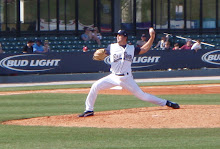
I've noticed recently that many of the Less More pitching clients have been struggling mightly through our hour long pitching lessons. After only 20 minutes of warm up and long toss, they are panting, sweating, and even dizzy. The weather is brutal, no doubt. In Virginia in July, the temp routinely tops 100 degrees with even more oppressive humidity. The kind of weather that has you sweating the second you step out doors. What's worse; there's been no rain in almost 2 weeks and the ground is dry and scorched. As tough as the weather is, I always tell my clients that baseball is played in this weather every single day. Heck, when I played in Mobile in 2008, the rain would come around 5pm, raining out batting practice, only to have the field turned into a sauna for game time after the sun came back out. Try gripping a baseball when your arm and the air itself is sweating!
So I am here to shed some light on a few secrets I've picked over the course of my career to help you battle the heat on the mound...
1. Hydrate! Too many times I see my pitchers dying of thirst even though they've brought a bottle of Gatorade with them for the lesson. The problem is, by the time you are thirsty, it is too late to get fluids. A pitcher must drink water 30 minutes and an hour before hand to make sure the body is properly hydrated before the physical activity begins. That way, when you start to sweat, drinking will help maintain your hydration.
2. Work Out in the Heat. Most people agree that pitchers should run both long distance and sprints in between their pitching outings. Those workouts should be done at least some of the time in the same conditions of a mid-day game. Sure it makes the work outs harder, but that is basically the idea we are shooting. A pitcher must acclimate his body to breathing oxygen in humid air and exerting himself physically when the sun is at its hottest.
3. Get Proper Rest. The advantages of sleep are compounded when a pitcher is working out and pitching in the heat. Sleep allows the body to recover from all of the physical work of the previous day. If the body doesn't get a MINIMUM of 6 hours, it will be unable to function at its highest potential the next day.
4. Use Antiperspirant. No, I am not suggesting that you stink when you sweat. (Although that may be true). When your arm begins to sweat in the middle of a game, it can make gripping the baseball difficult. To combat this, spray deodorant/antiperspirant on your entire throwing arm. This will not completely eliminate the sweat, but it will minimize the liquid during your outing.
5. Use Pin Tar. Under the hat, on the laces of the glove, on your belt hook - if you ain't cheatin' you ain't tryin. Learn what the sticky stuff feels like and get used to how much you need to create some tackiness on those finger tips. This age old secret is only a problem if you get caught. (I do not normally condone this line of thinking - pine tar is the ONLY exception). You can rest assured that almost every big league pitcher utilizes pine tar in one form or another.
6. Feel the Spirits of Ammonia. This ancient Indian remedy has been used to help invigorate and revitalize. There may be more myth to it than actual medical value, but all I can tell you is that rubbing your neck with an icy towel dipped in this stuff (mixed with a lot of water) does wonders for keeping you sharp in the summer heat. Keep in mind that Spirits of Ammonia is not the same as actual Ammonia. Make sure you know the difference before attempting to use this remedy. One of my former coaches used to keep a cooler full of water, ice and spirits of ammonia in the dugout for many of our summer tournaments.
7. Keep a change of shirt and socks. For particularly sweaty days, its a good idea to have a second dri-fit under shirt and dri-fit game socks to change into if you happen to sweat through your first pair. Sometimes a fresh shirt is all it takes to get you back in the zone.
So be sure to get comfortable with all of these changes before you implement them in the championship game of your tournament this summer. However, once you get used to using them, you'll never play a game without them.
Post some comments with other ideas!
Until Next Time!
 er has now begun to swing back in the hitters favor. You have proven yet again this really is the "year of the no-hitter." While the record is eight no-nos in season (1984), that was in the dead ball era. No, in the live, post-steroid era, you have achieved near perfection for the first time in your career.
er has now begun to swing back in the hitters favor. You have proven yet again this really is the "year of the no-hitter." While the record is eight no-nos in season (1984), that was in the dead ball era. No, in the live, post-steroid era, you have achieved near perfection for the first time in your career.

